|

| |
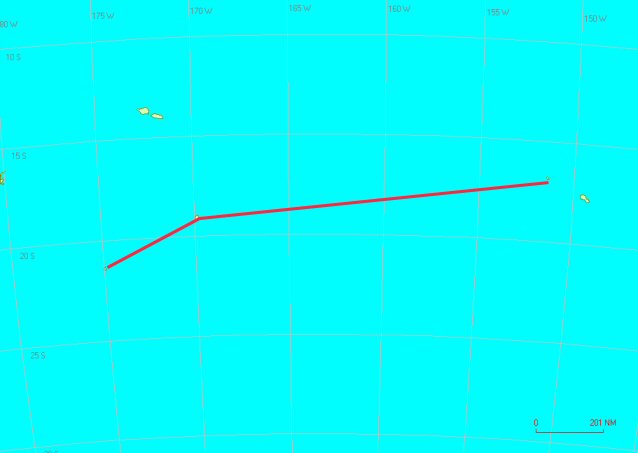
06/06/2008
HERMITS AND GIANT CLAMS...
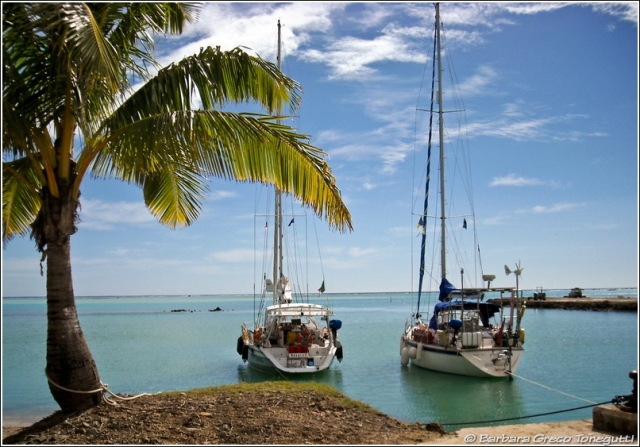
Shaula3 and Stargazer moored inside Aitutaki's lagoon
We are talking about Aitutaki, one of the Cook Islands, and the hermits of the
title are in fact HERMIT CRABS!
Aitutaki is not visited by many yachts, despite being on the rhumb-line between
the Society islands and Tonga, because the entry channel is only 1.5 meters deep,
and anchoring on the outside of the reef is possible but exposed to the waves
and to the risk of wrapping the anchor chain around the coral formations!
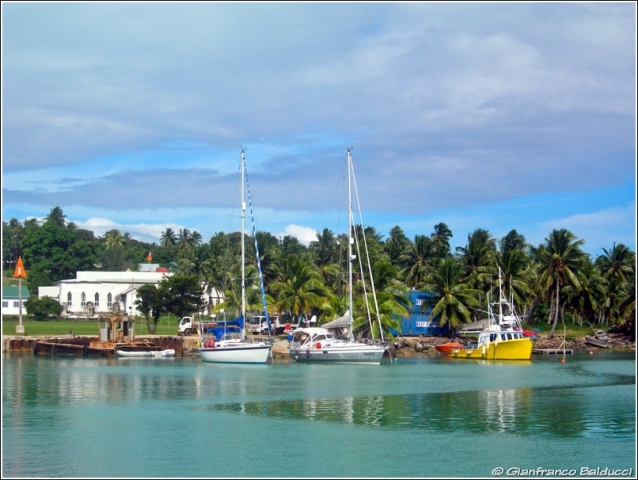
The lagoon surrounding the island is deemed to be one of the most beautiful in
the world, and even if this may be a bit of an overstatement, its certainly a
very nice and still unspoilt place: just few hotels embedded in picture-postcard
sceneries, and the odd yacht.
(In retrospective, I believe I was too
conservative at the time. Aitutaki really is one of the most Beautifull
places we visited, if not THE best!)
Unfortunately this is not the right season to see sea-turtles, which have
already left to head west (but we saw a couple of males which, by the way, under
water are not turtle-slow at all!), but we saw for the first time the Giant
Clams (Tridacna is the scientific name): they are all in all identical to the
small clams which abound on the coral reefs we have seen until now, but they are
HUGE!
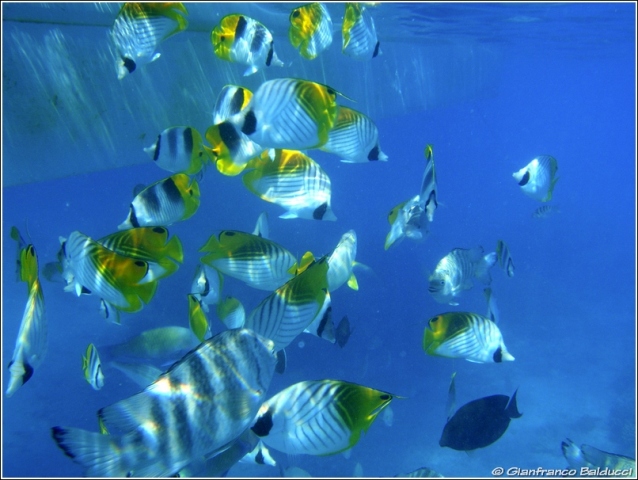
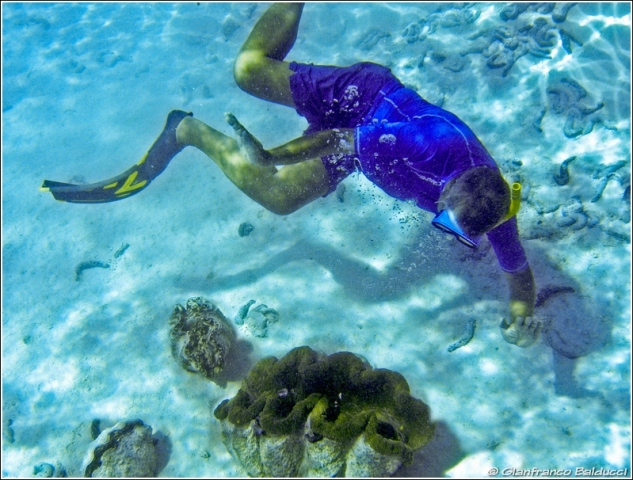
I tried to tickle one, and it immediately snapped close: we have been told that
they are actually dangerous, one can really get a hand or a foot trapped and
they hold tight for several minutes, which can be fatal for a swimmer.
The beaches of the various palm-fronded islands have another feature: most
shells are MOVING! Not just one or two, but literally hundreds of shells of all
shapes that walk around: they are Hermit Crabs, sort of shrimps that inhabit
empty shells (no idea if they actually kill the former owner).
They are funny-looking and of all possible shapes and colors, when they are
disturbed they close themselves in, leaving only two round eyes protruding out.
On an island called "Honeymoon Island" the red-tailed birds (a sort of seagull
with a thin, red tail) are hatching their eggs, and some of the new-borns are
hidden in the bush: they look funny and very similar to baby "boobies" like the
ones we saw in Galapagos (although the adults are quite different).
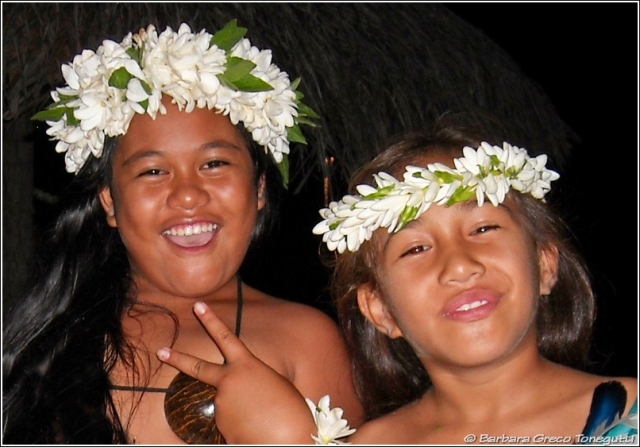
Time to leave again, Tonga is waiting for us, but this stopover in a
little-visited place has certainly been worthwhile!
08/06/2008
PARANOIA AND CONVERGENCE...
1) Paranoia: arriving in Aitutaki, for the first time the entry formalities
included a visit from the health officer, who impounded all our fresh fruit and
vegetables (luckily there was not much left!...).
In this part of the world, that's rather normal: the worst we will encounter in
Australia, where they will take away also meat, pasta, cheese, flowers and
plants, shells, souvenirs made of wood or shells, and another long list of stuff.
...and do not even think of hiding these things, they search the boat!!
Even if it seems a bit over the top, there is a reason for this: they are trying
to avoid importing pests that they currently do not have. In Aitutaki for
example, they try to avoid importing Fruit Flies from Tahiti.
Paranoid, but up to a point: we saw an example in Tahiti itself, where the lush,
varied and colorful vegetation of the island's interior is being replaced by an
ugly brasilian plant with red leaves that some idiot has imported and is now
spreading very fast: now they had to import a brasilian worm which eats the
plant's leaves, killing them (but what will the worm eat, when he will be
finished with the red leaves?).
2) Convergence: convergence ZONE, to be precise.
I'll explain: in the northern hemisphere, wind around depressions rotates
counter-clockwise. In the southern hemisphere, quite the reverse.
And what happens in the middle? A mess! A little south or north of the equator,
a convergence zone forms, where the weather is perturbed and chaotic.
Now, guess where is the convergence zone at the moment? Right, exactly above our
heads and spreading towards Tonga!
Result: rain, torrential rain, thundery rain, all with wind, no wind, a lot of
wind, depending on the mood.
Still several days to Tonga, and it looks like it will all be like this...
09/06/2008
HALFWAY THROUGH!
Last night we completed 180° from our departure point, we are halfway through
the voyage!!
13/06/2008
WHAT BROCHURES NEVER TELL YOU...
Come see the tropics, sun, blue skies, beautiful girls on golden beaches, azure
and clear waters, they say.
Then you find out that golden beaches are extremely infrequent and most likely
an hotel has been built on them, the sea water is often muddy due to the wave
action, the girls weigh over 100 kilos and it rains all the time...
Ok, I'm exaggerating a little bit, obviously there are beautiful places around
but the worst surprise for me has been the weather: scorching sun that burns
your skin in minutes, but also frequent rain squalls lasting few minutes but
very heavy and often coming together with strong wind gusts. When we are sailing
we see them coming on radar and may try to dodge them, but it's not always
possible especially when they form right over your head!
Today in Tonga it's a particularly gloomy day: it's raining all the time and if
one dares going somewhere he is sure to get a wash: let's hope it will not
continue like that in the next days or we risk to be unable to enjoy what was
supposed to be one of the more exotic stops in this voyage!
22/06/2008
TONGA
It's hard to make an assessment of our visit to Tonga, or more precisely the
Vava'u Group, the northernmost islands of this large archipelago.
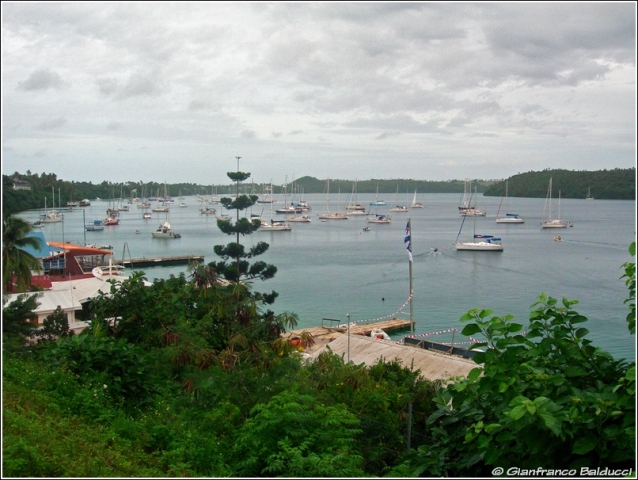
Neiafu harbour, island of Vava'u
All in all, we have been somewhat disappointed, although we have been biased by
several external factors, beginning with our arrival, tired and nervous after a
last night with strong wind, large and dangerous seas and torrential rain, which
continued for some days also after our arrival.
Then, we found out that we have to be in Fiji by June 26th, meaning that we had
to cut short our stay here, leaving one day earlier but doing customs clearance
3 days before (here NOBODY works on week-ends!) therefore losing some precious
cruising days.
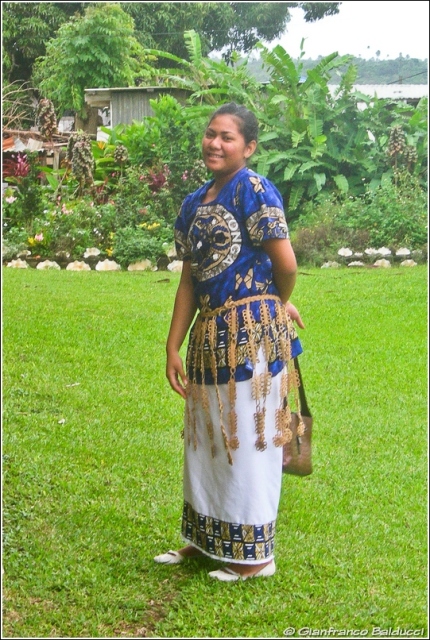
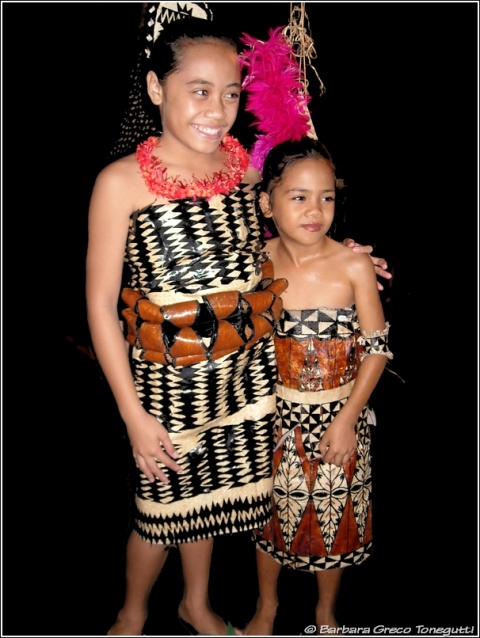
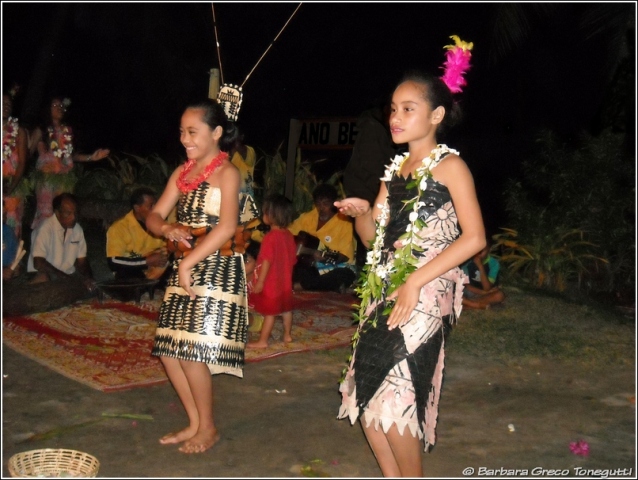
Like in most islands, traditional dances are
demonstrated only by kids
The last straw was the people's attitude: they may call themselves the "friendly
islands", and friendly and cheerful they are, but all businesses have been set up by foreigners, and the
Tongan
personnel is perennially grumpy and lazy.
Finally, the country seems to be mismanaged: it's still a kingdom, with the
happy face of the King, clad in an opera-house style military uniform, showing
on every banknote, but bureaucracy is heavy-handed and all public-utility works
have been funded by the European Community even against the opinion of the local
government.
The islands themselves are strange, very different from what we saw until now:
low-lying and flat-topped, with sheer coastlines and split into many islets
connected by underwater coral reefs, forming a veritable labyrinth of passages
and anchorages where navigation is difficult and GPS is inaccurate (the charts
are based on surveys done in the 1800's!). Luckily, the Moorings charter company
has printed a booklet where they give a lot of useful information coupled with a
bit of history and legends as well.
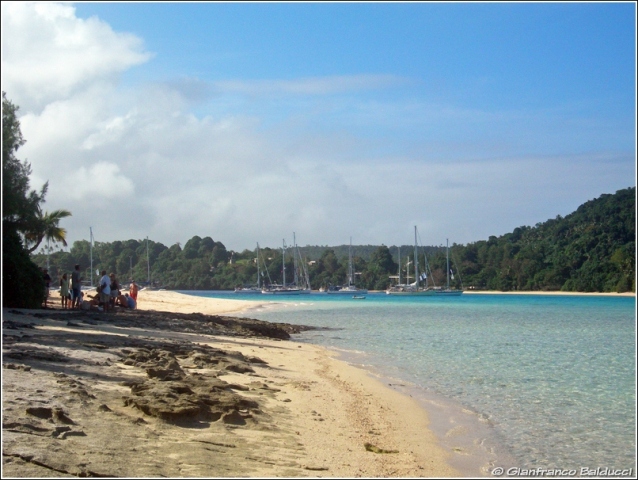
The Rally yachts anchored in front of one of the few beaches
Our bad mood was certainly not helped by the fact that the engine has a
mysterious electrical problem and the calorifier is leaking like a sieve: more
repairs to be done!
Now we have left, bound for Fiji, which welcomed us with the request to inform
them by fax of our arrival, and the threat of huge fines if we do not behave: so
much for welcoming tourists...
24/06/2008
DATE CHANGE...
We are about to arrive in Fiji and, in doing so, we will cross the 180° meridian,
the date-change line.
We will not change date now, though, because we already did when arriving in
Tonga, which opted to have the same date as Fiji although they should be 23
hours behind (this way, they are just 1 hour ahead).
The night passage through the string of islands and atolls that closes the
Fijian archipelago to the east has been rather unnerving, with the atolls that
were completely invisible also to the radar.
06/07/2008
BULA!! (or: FIJI, part 1)
I'll explain: "BULA" more or less means "hello" and is the greeting that the
Fijians address enthusiastically to everybody they meet.
Despite the somewhat unwelcoming attitude of the authorities, the people is
cheerful and welcoming!
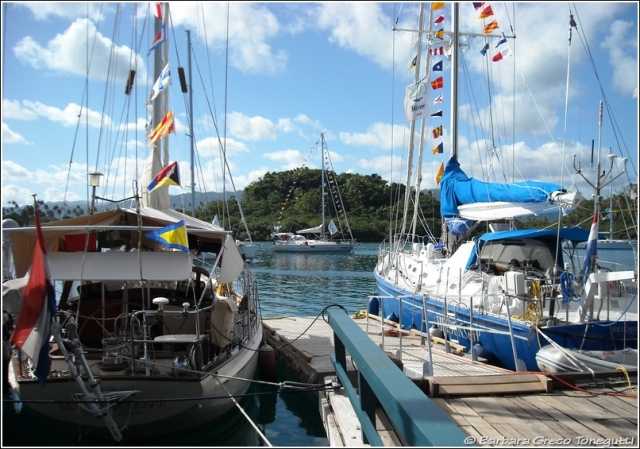
Shaula3 moored at a buoy in front of Savu Savu Yacht Club
Strange mixture of new and ancient, even if all villages have cars and
satellite-TV, they are still strongly attached to the tradition of the "sevu-sevu":
every visitor is expected to report to the village chief, under the sponsorship
of one of the elders, and present him with a package of yanqona roots (pronounced
"janggona") wrapped in a newspaper (strictly recent: maybe they read it later!).
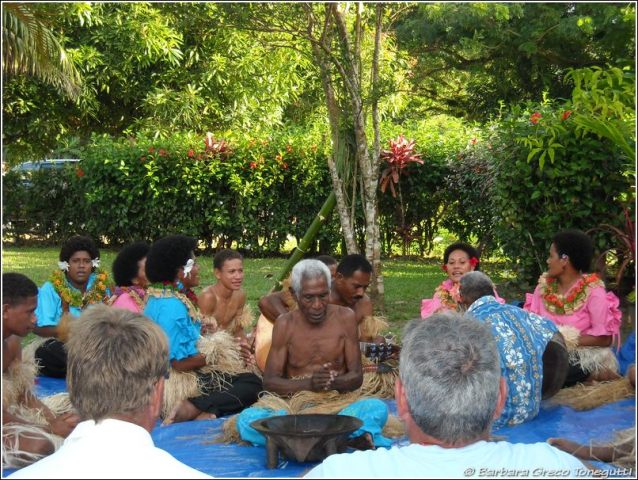
A village elder welcomes us with the "sevu-sevu" ceremony
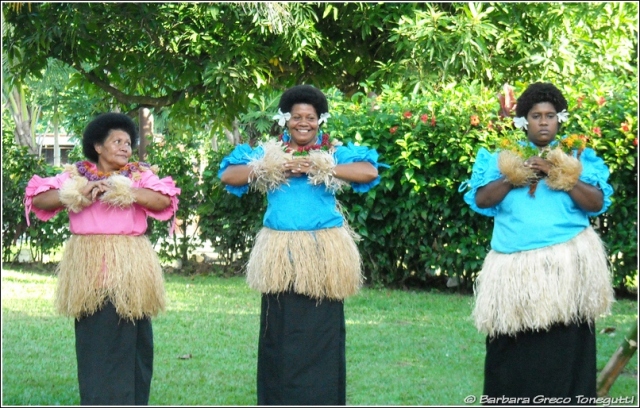
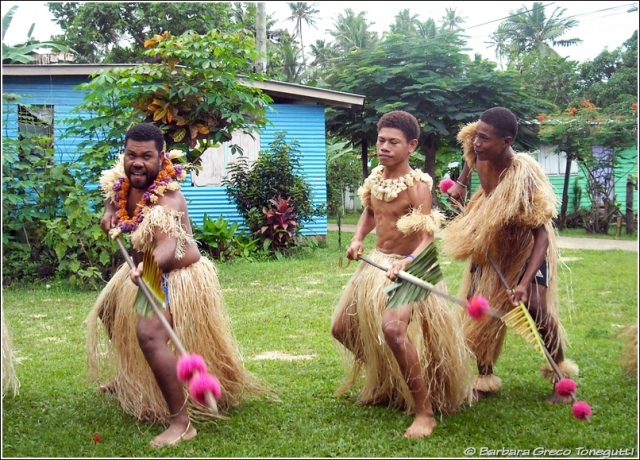
If the chief accepts the present, he commands some villager to use the roots to
prepare a beverage called "kava" (they actually chew the roots and then spit
them into the bowl....): it looks like dishwash water, but tastes worse (!...).
The stuff is poured into a large bowl which is placed in the middle of the
assembly, then a villager starts serving a small bowl to each visitor, one at
the time: the visitor claps his hands once, takes the bowl (with both hands!),
drinks in one gulp and then claps 3 times in appreciation, while all the
villagers do the same. When everybody has had his turn, they start all over
again until the bowl is empty, unless the chief has the bowl refilled one or two
times...
Once the ceremony is over, the visitor is treated as a member of the village,
quite literally.
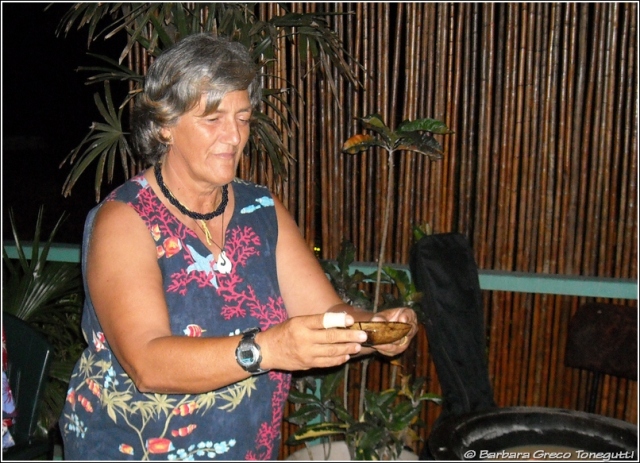
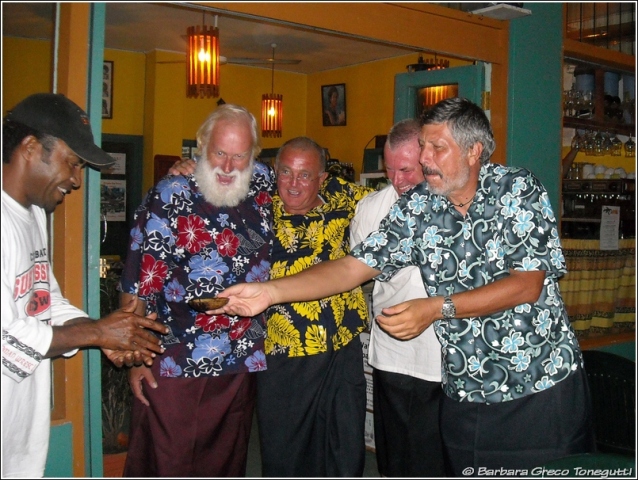
Strangely, no one has ever died after drinking this ugly stuff (that is, except
those that were cooked by the villagers themselves, but that was a long time
ago!).
Speaking of which: last sunday, the local church was celebrating the "day of
forgiveness", to ask God to forgive them on behalf of their ancestors for having
eaten the first missionary who came in this area a couple of centuries ago!
Friendly people, despite these strange habits, and very different from the
Polynesians, although some customs are similar: they look much more african than asiatic, although they came here more than 3000 years ago.
There's a lot of Indians around as well: half of the population, actually, and
once again the more enterprising, which has created quite a few tensions between
the two ethnic groups.
Prices are generally very low, a lot of Ralliers had shirts and dresses MADE TO
MEASURE for few Euros, and a good meal at a restaurant may cost less than 10
Euros: a much needed relief, after Polynesia's high prices!
And what about the islands themselves? Quite different once again: 2 large ones,
Viti Levu and Vanua Levu, and many small islands and atolls that form a sort of
belt around the two large ones. Coral reefs abound, and the nautical charts date
back to the time of Capt. Bligh (yes, him again! While he was escaping from the
chasing locals on the small boat where he was abandoned by the mutineers, the
good captain was still finding time to plot charts along the way!).
Pity that....drums rolling....try to guess....well yes, it's RAINING!!! VERY
MUCH SO!!!
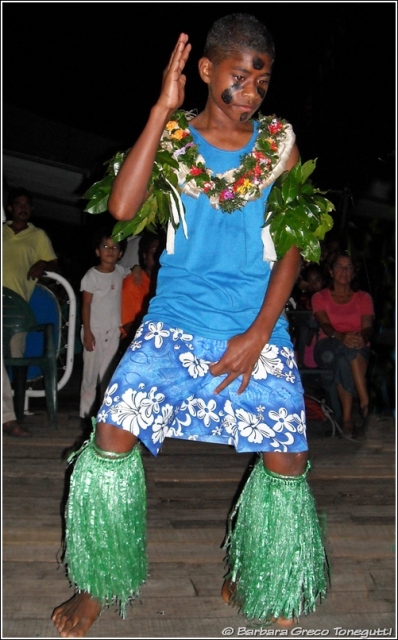 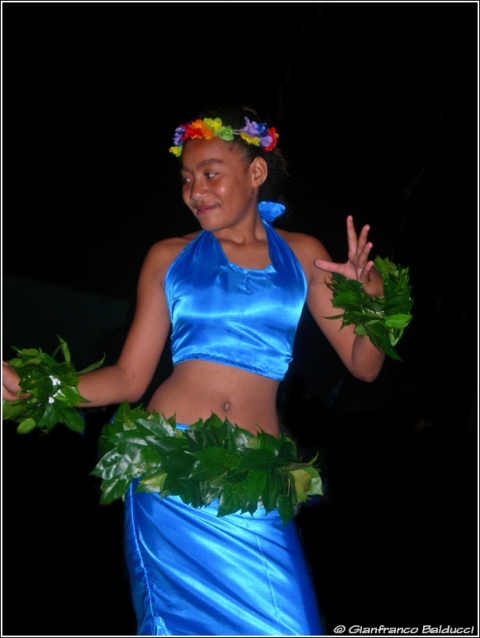
The yacht club kids performing traditional dances as a means
to raise money to buy new boats. Obviously the Rally people was
sympathetic and generous!
FIJI - Part 2
After a pleasant (if a little bit wet...) stay
at the Savu Savu Yacht Club, we headed west, circling the island of Viti Levu to
then enter the lagoon at the western side and reach the small quay at Musket
Cove, a resort on the little island of Malolo Lei Lei. Rather
annoying to have to do Customs formalities between two ports in the same Country
(here the Government definitely has a very bad opinion of live-aboard
sailors...), especially so in light of the rather slow process!
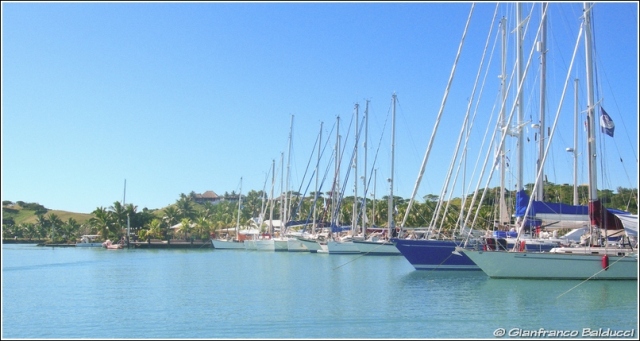
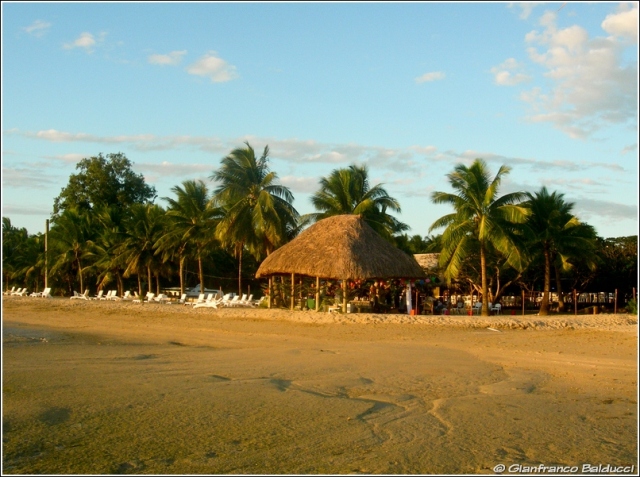
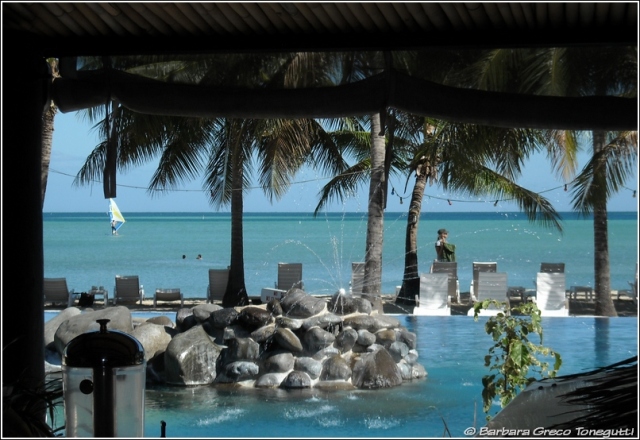
Our stop in Musket Cove lasts few days,
because we have booked a haulout for hull-cleaning and antifouling at the nearby
Vuda Point Marina, just south of the town of Lautoka, on Viti Levu; while Shaula
is merrily attended-to by a merry and chatty team of Fijians, we stay for some night at the
nearby hotel and allow ourselves a bit of tourism. We rent a car and
go as far as the capital Suva, where we visit the small but interesting museum.
Odd sceneries along the way, sometimes reminding Africa and sometimes feeling
like India (and in fact the Country is full of Indian workers and shop-keepers).
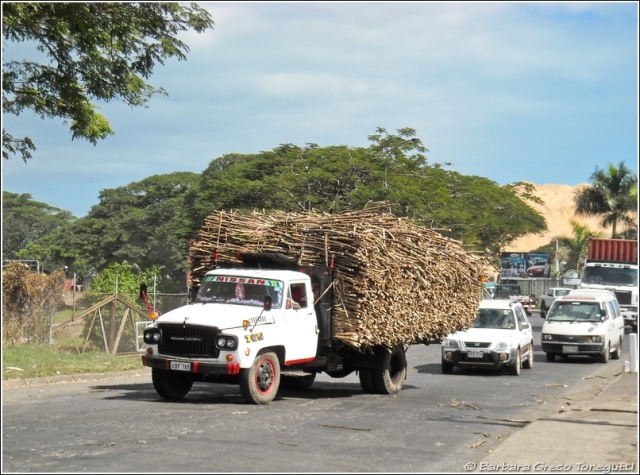
Trucks overloaded with sugar cane are a common sight on the roads
of Viti Levu
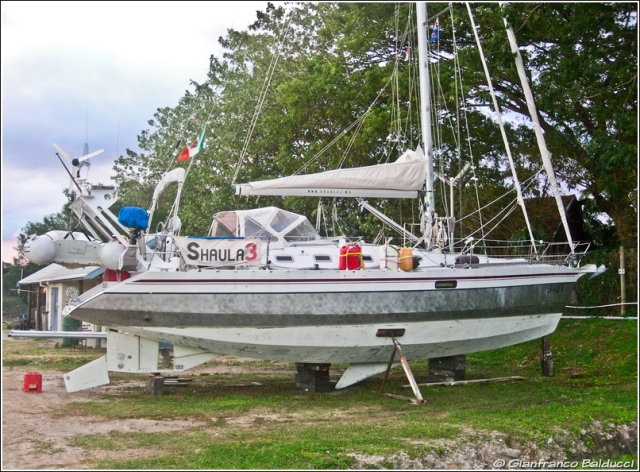
After one year of sailing, the hull of Shaula is still relatively
clean
At the time of putting Shaula back in the
water, a nasty surprise: one of the hydraulic pipes leading to the rudder's
lifting actuator is badly leaking due to a corroded connection.
Here I made a mistake, I should have called for help from the resourceful yard
guys and have a replacement fabricated, but instead I decided to patch it up
somehow, and obviously my repair did not last and I was forced to lock the
rudder blade in the down position for the rest of the voyage.
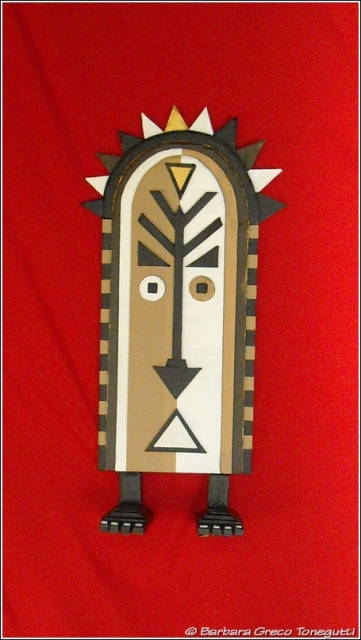
20/07/2008
TRADE-WINDS!
We are sailing from Fiji to Port Vila, Vanuatu: initially the wind was very
light and in the first couple of days we seldom switched the engine off. Since
yesterday the wind has built up from the SE between 20 and 25 knots, and we are
speeding towards our destination at an average of more than 140 miles per day,
that we have been able to achieve only in few occasions before.
For a supposedly constant wind, trade-winds have turned out to be quite
capricious!
We complicated our life though, by not having a dedicated downwind-sailing
configuration, and the result is that we lose about 1 knot compared to
similar-sized boats when sailing straight downwind.
Conversely, we keep the pace of even larger boats when the wind is broad on the
beam, but unfortunately these conditions are not all too frequent and, if they
persist for one or two days, generate a heavy side swell which makes us roll
uncomfortably.
Let's enjoy it while it lasts, tomorrow we should arrive in Port Vila!
31/07/2008
TANKYU, VANUATU!
No, I did not misspell the title! Fact is that the local language, called "Bislama",
contains a lot of english words spelt as they are pronounced!
Actually, in Vanuatu they speak both English and French, because the Country was
governed from 1906 until independence in 1980 by a strange "Condominium" (that's
how they called it!) between France and Great Britain.
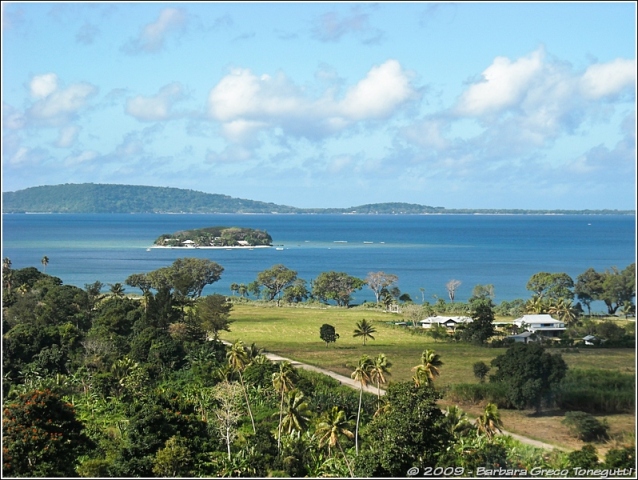
Near Port Vila, Efate island
We did not know what to expect from this stopover, which initially seemed to be
more a way to break the long passage to Australia, and we found an interesting
country, where most people still lives the ancient way, although everywhere they
use mobile phones (there is no village, however small and poor, where there is
not the Digicel's red sign saying "top-ups for sale here"!!).
Five outstanding memories:
- the waterfalls near port Vila, called "Cascades Waterfalls", a Beautifull
succession of little falls in the middle of the forest, that look like a
designer had a hand at them.
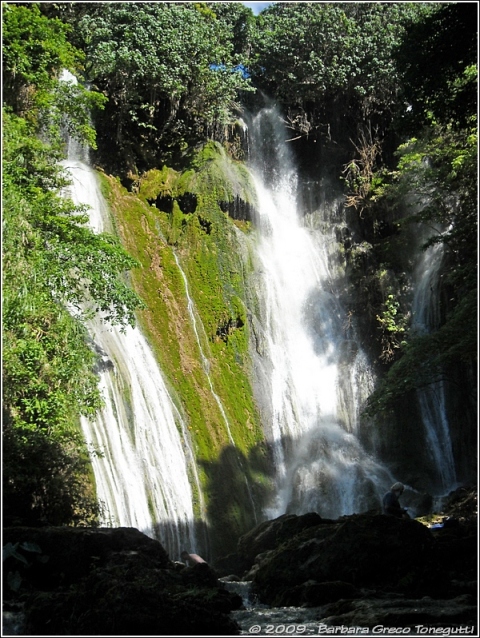
- the long rides in the trunk of a battered-down pickup truck along unpaved "roads"
across the island of Tanna, from the airport to the Yasur volcano, passing by
villages still made of wooden huts.
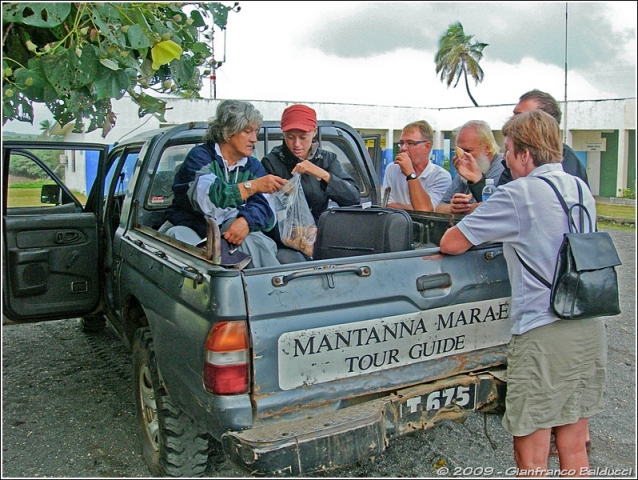
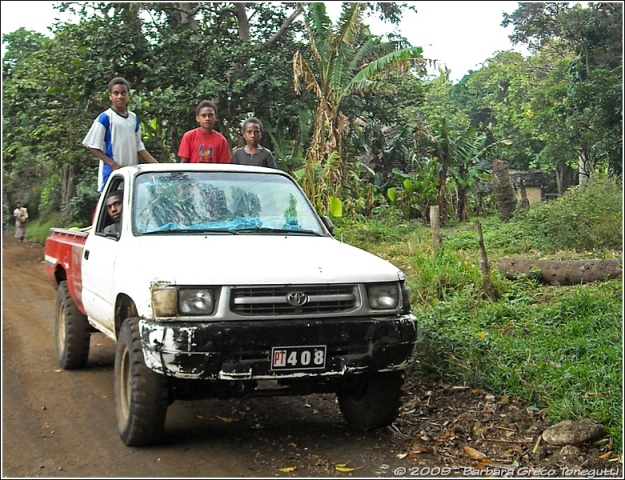
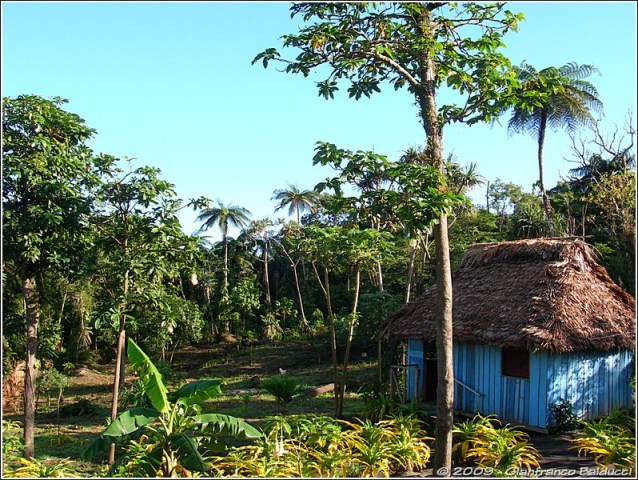
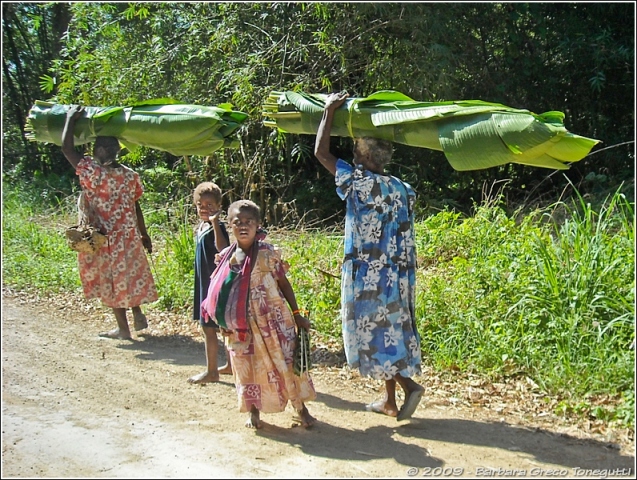
- the ride along the black-sand dunes at the foot of the volcano, just like in
the desert dunes!
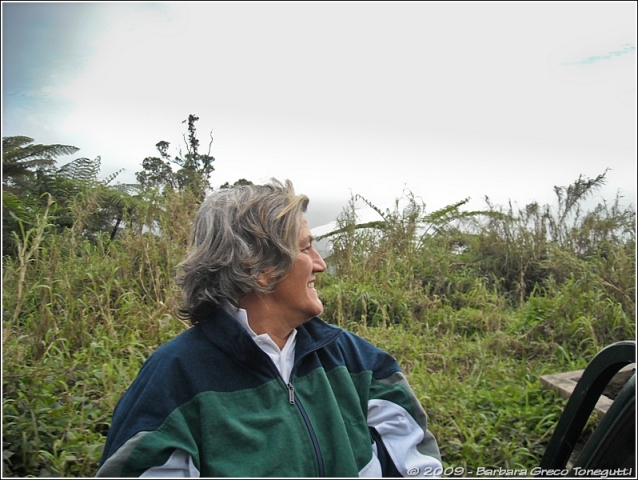
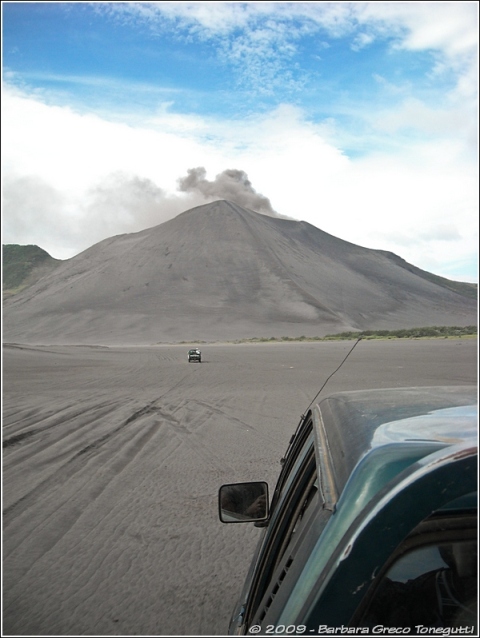
- the volcano's night show, with its continuous explosions of red-hot rocks (another
Rally group was barely missed by a large rock!).
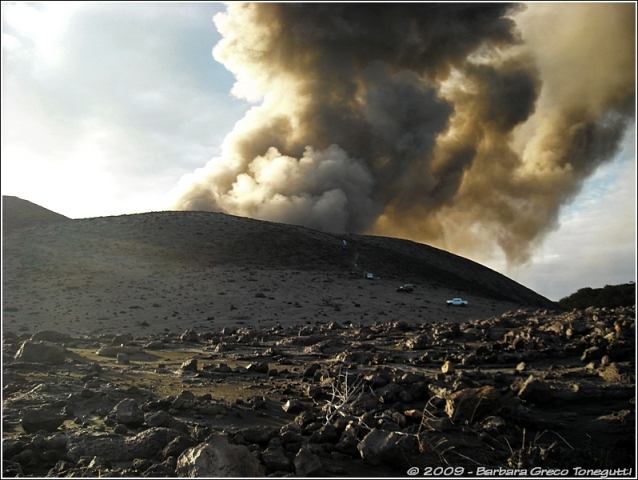
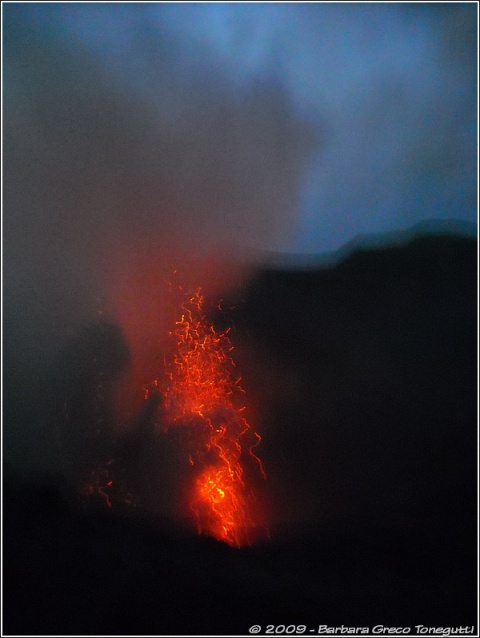
- the nearly-naked male-only dances at the "Kastom" village (so called because
they follow the traditional "customs").
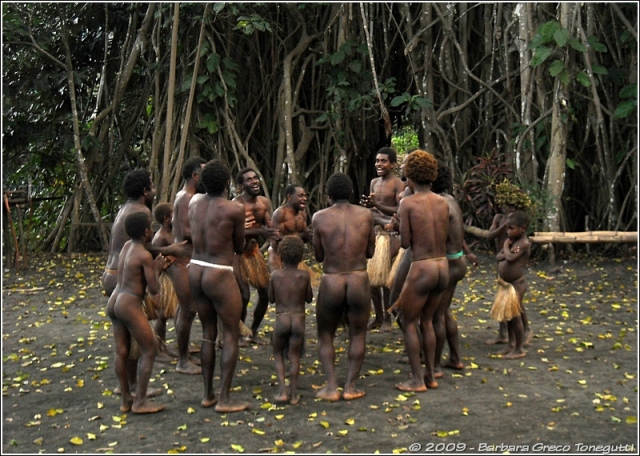
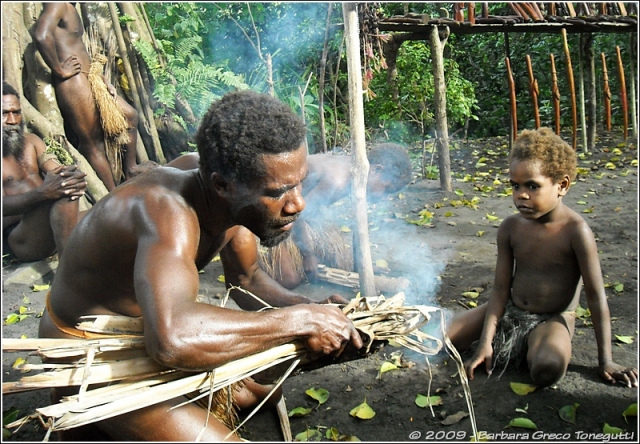
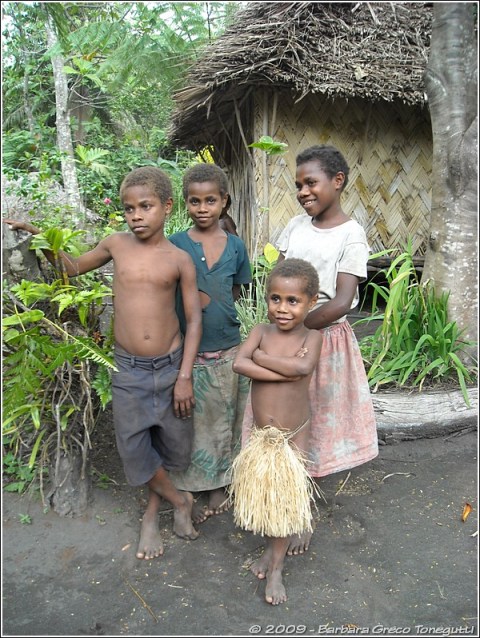
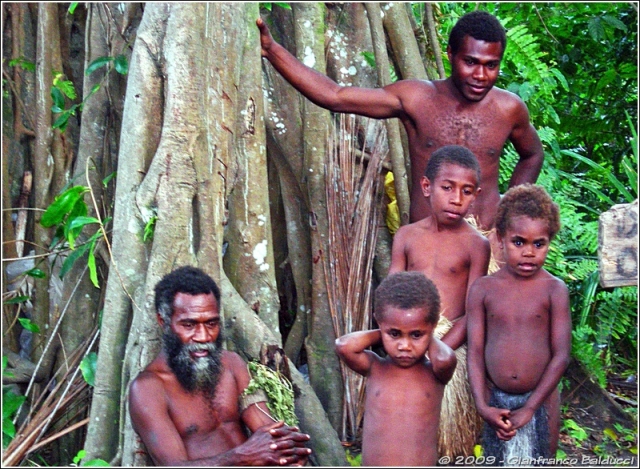
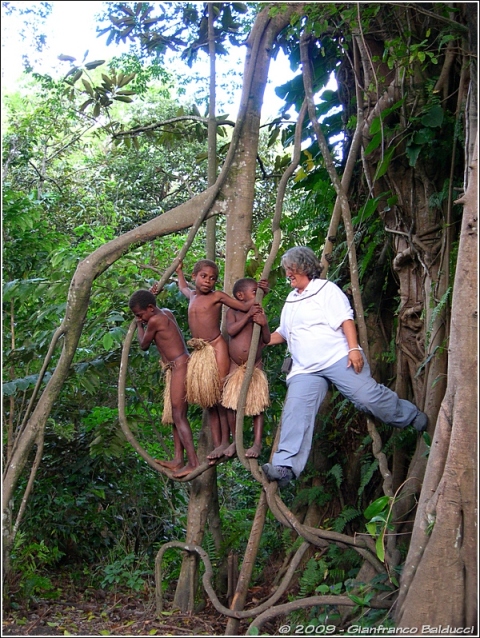
We could not see all the islands highlights, as each island has its own and some
events are seasonal, like the land-diving ritual which originated the
bungee-jumping (in this season the vines are
too dry and could break!), or take place in faraway islands.
The tourism industry is still rudimentary and naive, but growing fast: few more
years, and also these islands will be "modernized" and will lose most of their
spontaneity, alas!
02/08/2008
CHICKEN WITHOUT THE CHICKEN...
Thinking back to the trip to Tanna island, we should have guessed what was
waiting for us when the Travel Agency booked our flights with Air Vanuatu under
bogus names (I was "Paul" and Baby was "Alan"....) and even before departure
they told us that the return flight did not exist and they were going to send us
a small replacement plane just for our group...
Wake-up at 4 a.m. to catch a flight at 6:30, reason being a dead-slow check-in
procedure, not helped by the fact that our tickets did not appear on their
computer! Oh, obviously in the meantime it was raining heavily!...
Once arrived at Tanna airport after an uneventful flight, second surprise: our
cars have failed to show up! Clearly this must be far from unusual, as the
Agency sent one of their people to assit us through the whole trip: he starts
making phone calls, assisted by "Chalan", a local guy who is more or less the
owner of the resort where we will sleep tonight.
Finally, one car arrives: not a mini-bus, mind you, but a battered-down pick-up
truck not even equipped with benches in the trunk: people sits on the trunk's
edge or on the (not very clean...) trunk floor or, like Baby, on the spare tyre!
We leave, while the second half of the group stays there waiting for the second
car, and we rattle along a non-paved road that quickly turns into a trail...
Our car makes funny noises, the brakes do not work properly (!!...) and when
climbing it makes worrying noises like if it is going to break down any time,
which it finally does: the driver decides to return several kilometers back, and
drops us with our luggage under a tree near a sort of "shopping centre" where we
will have to wait for a replacement car...
One hour passes by, the second group's car passes by as well, and finally an
even older pick-up shows up: we climb on-board, and off we go on an ever
worsening road.
Along the road, we pass villages of wooden huts, and often meet groups of people
working in the fields or walking long distances (sometimes talking with a
cell-phone: paradox of modern technology!...): all smile and wave, and we do the
same.
After one and an half hour, suddenly we find ourselves running down a black-sand
slope: we are under the volcano! Finally, after a trip of more than two hours,
with our bottoms aching due to the bumps, we reach our "resort": 3, and I mean
3, straw and wood huts, each with 2 or 3 beds (where they were planning to
accomodate our group of 20....), 1 toilet for the whole place, no electricity
and NO WATER!!!
Chalan finds a way to accomodate half of our group in another, nearby "resort",
and we all go to have lunch: obviously, the dining hut has two small tables and
10 chairs in total, and the only food is a bowl of spaghetti with tuna...
With the promise of a "meat stew" for dinner, we leave for the "Kastom" village
where the men, coming out of a tunnel through a huge Banyan tree and practically
naked, perform a series of traditional, very primitive dances. The chief
initially plays the tough-man, but when he sees that we are willing to buy their
rudimentary craftware, he opens up and by the time we leave it's all big cheers
from both sides...
Up the volcano before dark: the climb is not long but is made difficult by the
sand moving under our feet, and there is a cold breeze to boot, but as soon as
dark comes the sight from the lip of the crater is worth all the pain! The
descent in the dark will prove a challenge in itself, as nobody thought to bring
a torchlight (we use the mobile phones to light the path...).
The long-awaited dinner: a bowl, not even a large one, with a lot of vegetables
and few small pieces of meat, difficult to find in the candle-light...
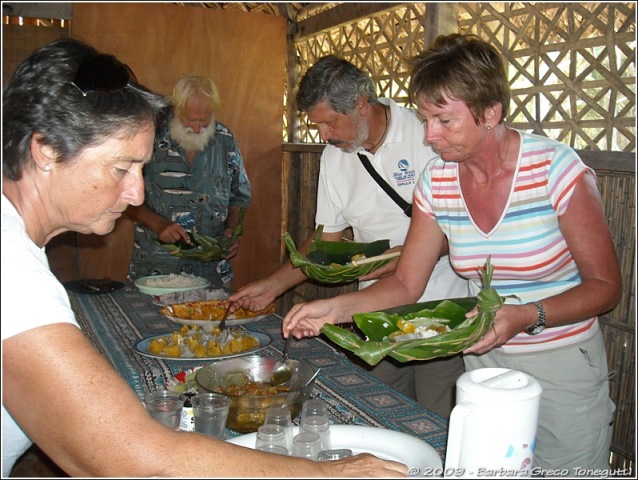
The "chicken without chicken"
The next day, we decide to have lunch at a "restaurant" in a nearby beach (nearby=
1 hour by car!!), but the story is the same: instead of the meat-less meat, this
time it's a chicken-less chicken (good, if you could find it!...) after which a
long ride to the far away airport awaits us. We are very late, but that will
turn out to be not a problem, as our "special" airplane is late as well, and in
the meantime we have eaten (or drunk, depending on the inclinations) all the
stores of the little airport shop.
Funny thing, that does nothing to make us more confident about our airplane, at
the check-in they weight the passengers together with their luggage!! When we
see the plane, we understand why...
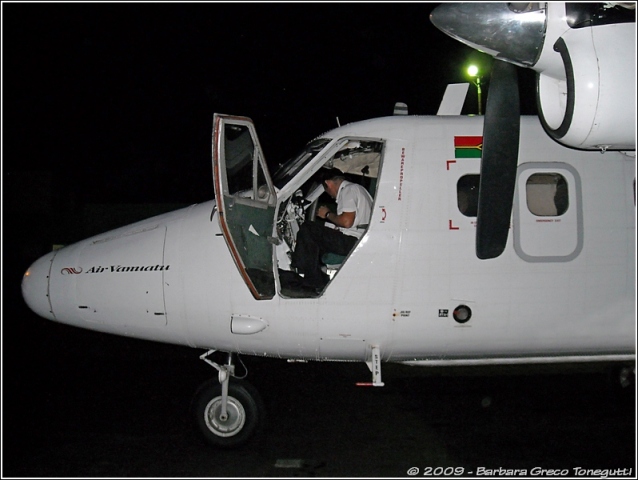
CONTINUE
READING...
|